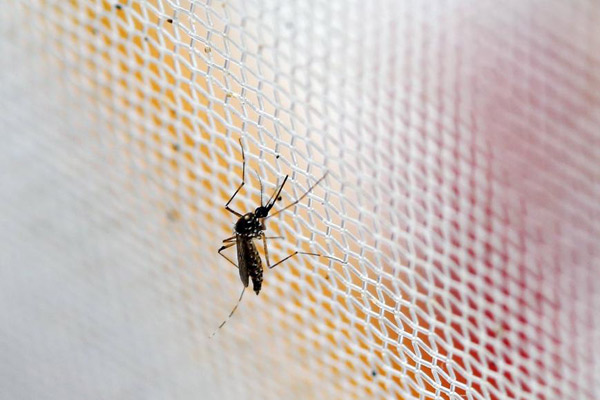

 |
| A mosquito is seen in the Gorgas Memorial institute for Health Studies laboratory in Panama City, Feb 4, 2016. [Photo/Agencies] |
BEIJING -- China has confirmed an imported case of Zika virus, the country's first, the National Health and Family Planning Commission (NHFPC) announced late Tuesday.
The patient, a 34-year-old male from Ganxian county of Jiangxi province, is now recovering with normal body temperature and fading rash.
He had traveled to Venezuela and showed symptoms of fever, headache and dizziness on Jan 28, before returning to his hometown on Feb 5 via Hong Kong and Shenzhen.
He has been quarantined and treated in a hospital in Ganxian since Feb 6.
The NHFPC said that according to evaluation by public health officials and experts, the risk of further spreading of the virus due to this imported case is extremely low due to low temperature.
Symptoms of Zika virus, which spreads to people through mosquito bites, include fever, joint pain, rash, conjunctivitis, headache, muscle pain and eye pain.
Mosquitoes to be used against Zika in China
A pilot field study using mosquitoes infected with bacteria is expected to be launched in South China probably in March, according to a lead researcher.
The move is aimed at reducing the local mosquito population, which could pass the Zika virus to humans, said Xi Zhiyong, who heads the study.
Xi is a microbiology professor at Sun Yat-sen University in Guangzhou, Guangdong province.
Millions of laboratory-produced Aedes aegypti mosquitoes infected with the Wolbachia bacteria will be released at two or three trial sites in Guangdong.
Last year, the team lowered the mosquito population by 90 percent during a trial using the same method and helped to contain a local outbreak of dengue fever. Both dengue and Zika are viruses spread by the Aedes aegypti mosquito.
Xi said the researchers only release male mosquitoes, which don't bite. The eggs produced by females mating with Wolbachia-infected males are infertile, which leads to reduced mosquito populations.
The Zika virus, which has been linked to severe birth defects in thousands of babies in Brazil, is spreading rapidly in the Americas.
The US has reported a sexually transmitted Zika case, but the World Health Organization has said more investigations are needed to verify this.
No Zika cases have been reported in China to date. On Thursday, the National Health and Family Planning Commission ordered the mass extermination of mosquitoes.
Xi said the team is working on ways to produce more Wolbachia-infected mosquitoes and is considering drones to help release them in March.
The WHO has recommended studies of genetically engineered mosquitoes and those infected with bacteria to help with reduction efforts.
Xi said the genes of Wolbachia-infected mosquitoes are intact and the mosquitoes are safer for the ecological environment and other species, including humans.
But he said more field studies are needed to evaluate this method before it is used in other parts of China to control and prevent the Zika virus.
Guo Yuhong, a researcher at the Chinese Center for Disease Control and Prevention's Infectious Disease Institute, said Aedes aegypti mosquitoes can be found widely in South China and some northern areas of the country.
But she remains cautious about the Wolbachia-infected mosquitoes and feels that more investigations are required.
"They work in theory, but we are not sure about the potential impact that extinction of Aedes aegypti mosquitoes would have on the ecosystem," she said.
 Have you ever taken these beautiful subways in China?
Have you ever taken these beautiful subways in China? Chinese beauties, foreign models meet in Chengdu
Chinese beauties, foreign models meet in Chengdu Awesome! Aerial pictures taken on J-11 fighter
Awesome! Aerial pictures taken on J-11 fighter A foreign girl explains what China should be proud of
A foreign girl explains what China should be proud of Chinese navy's air-cushioned landing craft in pictures
Chinese navy's air-cushioned landing craft in pictures Chinese pole dancing master opens class in Tianjin
Chinese pole dancing master opens class in Tianjin Splendid Sichuan after snow
Splendid Sichuan after snow College girl of Vancouver crowned Miss Chinese Int'l 2016
College girl of Vancouver crowned Miss Chinese Int'l 2016 Pentagonal Mart becomes the largest vacant building in Shanghai
Pentagonal Mart becomes the largest vacant building in Shanghai Top 20 hottest women in the world in 2014
Top 20 hottest women in the world in 2014 Top 10 hardest languages to learn
Top 10 hardest languages to learn 10 Chinese female stars with most beautiful faces
10 Chinese female stars with most beautiful faces China’s Top 10 Unique Bridges, Highways and Roads
China’s Top 10 Unique Bridges, Highways and Roads After spate of espionage allegations, US law firm opens first China office
After spate of espionage allegations, US law firm opens first China office Author Feng Tang attacks decision to pull book from shelves
Author Feng Tang attacks decision to pull book from shelves Going ape for New Year
Going ape for New Year Black lungs
Black lungsDay|Week